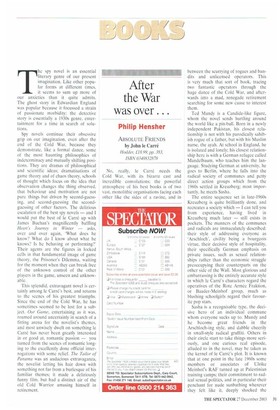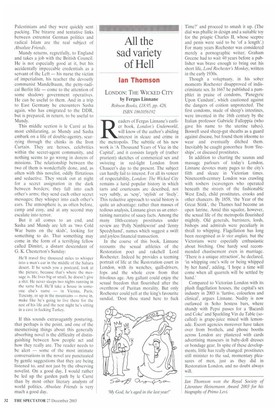After the War was over . . .
Philip Hensher
ABSOLUTE FRIENDS by John le Carre Hodder, £18.99, pp. 383, ISBN 0340832878
No, really, le Carre needs the Cold War, with its bizarre cast and incredible convolutions; the powerful atmosphere of his best books is of two vast, monolithic organisations facing each other like the sides of a ravine, and in
The spy novel is an essential literary genre of our present imagination. Like other popular forms at different times, it seems to sum up more of our anxieties than it quite admits. The ghost story in Edwardian England was popular because it focussed a strain of passionate morbidity; the detective story is essentially a 1930s genre, entertainment for a time in search of solutions.
Spy novels continue their obsessive grip on our imagination, even after the end of the Cold War, because they demonstrate, like a formal dance, some of the most haunting philosophies of indeterminacy and mutually shifting positions. They are dramas of philosophical and scientific ideas; dramatisations of game theory and of chaos theory, schools of thought which focus on the idea that observation changes the thing observed, that behaviour and motivation are not pure things but driven by second-guessing, and second-guessing the secondguessing of other factors. The delirious escalation of the best spy novels — and I would put the best of le Carre up with James Buchan's magnificently baffling Heart's Journey in Winter — asks, over and over again, `What does he know? What do I know about what he knows? Is he behaving or performing?' Their agents are the figures in locked cells in that fundamental image of game theory, the Prisoner's Dilemma, waiting for the moment when they can break free of the unknown control of the other players in the game, unseen and unknowable.
This splendid, extravagant novel is certainly among le Carre's best, and returns to the scenes of his greatest triumphs. Since the end of the Cold War, he has sometimes seemed to be lost for a subject. Our Game, entertaining as it was, roamed around uncertainly in search of a fitting arena for the novelist's themes, and most unwisely dwelt on something le Cane' has never been greatly interested in or good at, romantic passion — you turned from the scenes of romantic longing to the excellently done official interrogations with some relief. The Tailor of Panama was an audacious extravaganza, the novelist letting his hair down with something not far from a burlesque of his familiar themes; it made a deliriously funny film, but had a distinct air of the old Cold Warrior amusing himself in retirement. between the scurrying of rogues and bandits and unlicensed operators. This is very much that sort of book, tracing two fantastic operators through the huge dance of the Cold War. and afterwards into a mad, renegade retirement searching for some new cause to interest them.
Ted Mundy is a Candide-like figure, whom the novel sends hurtling around the world like a pin-ball. Born in a newly independent Pakistan, his closest relationship is not with his parodically sahibish rogue of a father, but with his Muslim nurse, the ayah. At school in England, he is isolated and lonely; his closest relationship here is with a German refugee called Mandelbaum, who teaches him the language. Studying German at university, he goes to Berlin, where he falls into the radical society of communes and petty direct action groups which from the 1960s settled in Kreuzberg; most importantly, he meets Sasha.
The entire sequence set in late-1960s Kreuzberg is quite brilliantly done, and recreates a society which — I can tell you from experience, having lived in Kreuzberg much later — still exists in pockets. The manners of the communes and radicals are immaculately described: their style of addressing everyone as 'Arschloch', civility being a bourgeois virtue, their decisive style of hospitality, their specifically German emphasis on private issues, such as sexual relationships rather than the economic struggle preoccupying their counterparts on the other side of the Wall. Most glorious and embarrassing is the entirely accurate style in which le Carre's characters regard the operatives of the Rote Armee Fraktion, or Baader-Meinhof group, much as blushing schoolgirls regard their favourite pop stars.
Sasha is a recognisable type, the decisive hero of an individual commune whom everyone sucks up to. Mundy and he become great friends in the Arschloch-ing style, and dabble cheerily in small-style radical graffiti. Others in their circle start to take things more seriously, and one curious real episode, alluded to in the novel, may be taken as the kernel of le Carre's plot. It is known that at one point in the late 1960s some members or associates of Ulrike Meinhof s RAF turned up at Palestinian training camps; their commitment to radical sexual politics, and in particular their penchant for nude sunbathing wherever they felt like it, deeply shocked the Palestinians and they were quickly sent packing. The bizarre and tentative links between extremist German politics and radical Islam are the real subject of Absolute Friends.
Mundy returns, regretfully, to England and takes a job with the British Council. He is not especially good at it, but his accidentally impeccable credentials as a servant of the Left — his nurse the victim of imperialism, his teacher the devoutly communist Mandelbaum, the petty-radical Berlin life — come to the attention of some shadowy government operatives. He can be useful to them. And in a trip to East Germany he encounters Sasha again, who has emigrated to the DDR, but is prepared, in return, to be useful to Mundy.
This middle section is le Carre at his most exhilarating, as Mundy and Sasha embark on a life of double-agentry, scurrying through the chinks in the Iron Curtain. They are heroes, celebrities within the secret-agent community, and nothing seems to go wrong in dozens of missions. The relationship between the two of them is wonderfully done, and, as often with this novelist, oddly flirtatious and seductive. They sneak out at night for a secret assignation in the dark between borders; they fall into each other's arms; they send each other secret messages; they whisper into each other's ears. The atmosphere is, as often before, camp and cosy, and at any second may escalate into terror.
But it all comes to an end, and Sasha and Mundy are left as 'two Cold War bums on the skids', looking for something to do. That something may come in the form of a terrifying fellow called Dimitri. a distant descendant of G. K. Chesterton's Sunday:
He'll travel five thousand miles to whisper into a man's ear in the middle of the Sahara desert. If he sends you a postcard, look at the picture, because that's where the message is. He lives big or small, he doesn't give a shit. He never sleeps two nights running in the same bed. He'll take a house in someone else's name — in Vienna, Paris, Tuscany, or up in the mountains — move in, make like he's going to live there for the rest of his life and the next night he's sitting in a cave in fucking Turkey.
If this sounds extravagantly posturing, that perhaps is the point, and one of the mesmerising things about this generally absorbing novel is the difficulty of distinguishing between how people act and how they really are. The reader needs to be alert — some of the most intimate conversations in the novel are punctuated by gentle suggestions that they are being listened to, and not just by the observing novelist. On a good day, I would rather be led up the garden path by le Carre than by most other literary analysts of world politics. Absolute Friends is very much a good day.



























































 Previous page
Previous page